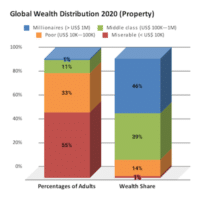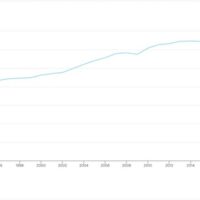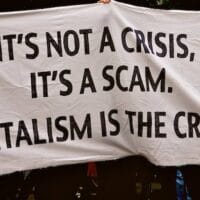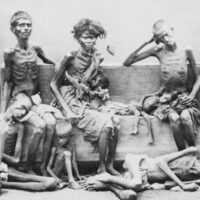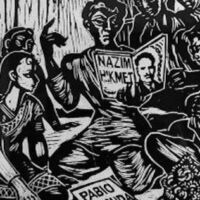-
Book Review: Marvin Harris- The Rise of Anthropological Theory: A History of Theories of Culture (2001). Reviewed By: Thomas Riggins
This is an indispensable book for all those on the left interested in understanding how the science of cultural (social) anthropology developed over the last three centuries and how it is used to understand (and sometimes control) non-Western societies, especially those that have not developed complex state structures.
-
Earth’s Greatest Enemy – A New Film by Abby Martin [OFFICIAL TEASER]
Abby Martin’s second feature film is an anti-imperialist environmental documentary.
-
World Inequality Report: Class divide explains more than regional divisions
The report clearly shows how the class divide has become relatively more important than the regional divide in determining global inequality. This simply tells that in today’s world where one is born and brought up has relatively less impact than in which class the person belongs to in explaining relative earnings and wealth status.
-
At doom’s doorstep: It is 100 seconds to midnight
2022 Doomsday Clock Statement
-
How to overthrow a life-threatening capitalism?
Capitalism jeopardizes the survival of humanity on earth. It reduces the price of the labour of reproducing labour power when it cannot make women do it for free within the family. How can we overcome it while putting the defence of life at the centre of our concerns?
-
Social sciences and the colonised mind
A CRUCIAL component of the imperialist system is the colonisation of third world minds that helps to sustain it. This colonisation is pervasive, but here we shall discuss only academic colonisation and that too relating to the social sciences.
-
Hormonal wars: A brief regulatory history of puberty blockers
The use of political and military metaphors in medicine is a tradition dating back at least to the turn of the 20th century when immunologists regularly distinguished between “Self” versus “Other,” and the “body’s own” defenses armed against external (and internal) enemies such as bacteria, viruses, or even tumors.
-
Ruthless criticism
We can trace the development of Marx’s critique through a variety of texts—many of them now quite famous, even if they are rarely mentioned or discussed within economics. There, we can see Marx’s ideas developing and changing, until he began to work on his critique of political economy, finally presented in Capital.
-
Challenging the poverty of words: Interview with progressive poet Frederick Pollack
San Francisco State University professor Daniel Langton has called Frederick Pollack’s poems “necessary” because “do what poetry should do—grapple with the important.”
-
Michael Löwy: ‘Revolutions’
‘Revolutions’ is a major contribution to our understanding of the principal social movements which shape our modern world.
-
A Programme for a future society that we will build in the present: The Second Newsletter (2022)
In October 2021, the United Nations Development Programme (UNDP) released a report that received barely any attention: ‘the Global Multidimensional Poverty Index 2021’, notably subtitled Unmasking disparities by ethnicity, caste, and gender.
-
Jason E Smith: ‘Smart Machines and Service Work: Automation in an Age of Stagnation’
Smith begins with Friedrich Pollock’s definition of automation as a ‘technique of industrial production [in which] the machines are “controlled” by machines’, and shows that this trend of automation, while increasing labor productivity in the industrial and manufacturing sector, is also the reason for a lack of automation in the service sector.
-
The U.S. makes a mockery of treaties and international law
The United States claims it is operating under a “rules-based order”—but the term is not the same international law recognized by the rest of the world. Rather, it is camouflage behind which American exceptionalism flourishes.
-
Dossier no. 48: We will build the future: a plan to save the planet
The most scandalous fact of the current period is that 2.37 billion people are struggling to eat. Most of them are in developing countries, but many are in advanced industrial states.
-
Relevance of the Manifesto of the Communist Party in the 21st Century.
The death of communism has been pronounced time and time again, but every day it is still fought against without respite or pity. There is no popular act or uprising which the bourgeoise does not see as a sign of communism, no nationalist or progressive opinion which is not branded as communist.
-
There is no Nobel Prize in economics
Let’s debunk a myth. There is no “Nobel Prize in Economics”. On Nov 27, 1895, when Alfred Nobel signed his will, he left five prizes in alphabetical order to: chemistry, literature, peace, physics, and physiology or medicine. The Nobel Prize in Economics is declared after the Panchapandavas above.
-
Beyond the Capitalist Paradigm of Destruction: Generative Chaos
The unexpected may occur, within the quantum perspective assumed by the new cosmology: the current suffering due to the systemic crisis will not be in vain; it is accumulating benign energies that will make a leap to another, higher-order.
-
Don’t look up reflects the cynicism of capitalist decay, for better and for worse
A lively debate has ensued over the merits of the film, Don’t Look Up. People on the progressive side of the political spectrum have praised the film for its piercing honesty about the climate crisis which is communicated through the metaphor of an incoming, planet-destroying comet.
-
The triple day thesis: Theorising motherhood as a capability and a capability suppressor
The triple day thesis of motherhood is conceptualized as a mother who engages in the reproductive work of childbearing and childrearing (the single day), in addition to waged work (the double day) and self-reproductive work (the triple day).
-
Globalization from Christopher Columbus, Vasco da Gama and Ferdinand Magellan until today
In North America, the European colonization started during the 17th century, mainly led by England and France, before undergoing a rapid expansion during the 18thcentury, an era also marked by massive importation of African slaves



